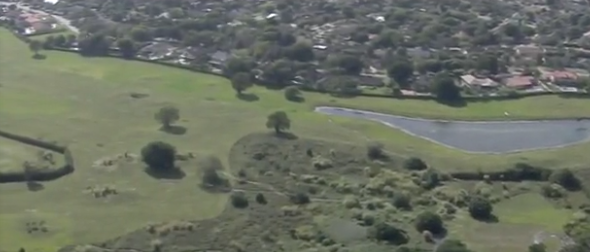Well, after years and years and suing and pleading and losing in court and Tallahassee and trying again and coaxing and buying properties and people off and threatening homeowners with frivolous lawsuits, developers who want to turn the Calusa Golf Course into 550-plus homes finally got a 75% vote of the homeowners to break a 99-year covenant so they can build.
Northeastern Golf LLC — which is owned by Facundo Bacardi, the owner of the property — and Fort Dallas Golf Club Ltd. will 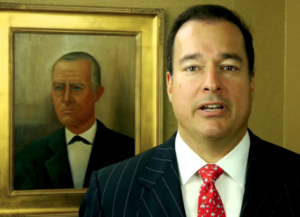 ask the Miami-Dade Commission on Thursday morning to release them from a 99-year covenant that prevents any use on the property except for the golf course, closed in 2014 and abandoned. And, because they have the required 110 signatures of 146 of the abutting property owners — dubbed “ring owners,” which sounds like a horror movie sequel — it looks like a done deal.
ask the Miami-Dade Commission on Thursday morning to release them from a 99-year covenant that prevents any use on the property except for the golf course, closed in 2014 and abandoned. And, because they have the required 110 signatures of 146 of the abutting property owners — dubbed “ring owners,” which sounds like a horror movie sequel — it looks like a done deal.
But there are still some homeowners who are against it, and it looks like there could have been some disingenuous claims at best, fraudulent representation at worst, that suddenly turned into a multi-million legal settlement. Las malas lenguas say some neighbors sold them out for $22 million.
Several homeowners plan to come to the meeting Thursday to beg commissioners, particularly District 7 Commissioner Xavier Suarez — who is running for county mayor — to leave the covenant intact. They say the Save Calusa Trust that was formed in 2012 to sue the county and protect the homeowners from development of the golf course has turned into the Screw Calusa Trust.
“They fraudulently spearheaded the campaign to save Calusa and scored some wins, but how do we know they weren’t just building the power to negotiate a multi-million dollar deal,” asked Vanessa Vazquez.
Take $22 mil and divide it by 110 and it’s just $200,000. People were bought 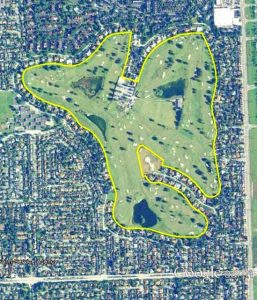 off for $200,000? Well, it’s more than the $50K a head they were reportedly offered in 2016. And the way it was explained to Ladra, some property owners may have more shares than others. And maybe developers promised homeowners an extra 50 feet of property in their back yards. That’s something else las malas lenguas say.
off for $200,000? Well, it’s more than the $50K a head they were reportedly offered in 2016. And the way it was explained to Ladra, some property owners may have more shares than others. And maybe developers promised homeowners an extra 50 feet of property in their back yards. That’s something else las malas lenguas say.
Vazquez bought her home on the golf course in 2016 and just assumed she was part of the trust fighting the development. So did the woman who sold her the house. So did a few neighbors who started to talk to her a year later about a coming settlement with the developers. A neighbor who also assumed she was part of the trust, gave her the number for Joel Tobias, the trustee. He was not happy to hear from Vazquez, asked her how she got his number and said the conversation they were having was illegal.
“I’ll never forget that. I was in the parking lot at Home Depot,” Vazquez told Ladra.
He gave her an attorney’s number. After the first couple of calls, the attorney never responded again.
Read related: Calusa golf course controversy shows ‘covenants’ are crap
In the meantime, however, someone else who thought she was a trust member (her address once was) left a memo on her door addressed to all Save Calusa Trust members signed by Tobias that, on the second page, explained the sale of the home meant relinquishing any shares in the Trust. At the very end, there was an asterisk that referred to Vazquez:
“Recently, I was contacted by a non‐Trust member Ring Owner requesting information regarding the Trust. I do not know how this Ring Owner obtained my contact information or became aware of my status as Trustee of the Trust. I wish to remind all Holders that the Trust’s activities are for the benefit of the Holders only and that all matters relating to the Trust or the purposes of the Trust are governed by the terms of the Trust Agreement, and in this regard, the Trust Agreement contains specific confidentiality and non‐disclosure provisions. No information regarding Trust matters should be disclosed or discussed with anyone who is not a Holder (member of the Trust), and any such disclosures or discussions violate those governing provisions of the Trust Agreement. There is no reason to discuss any Trust matters with any outside parties and such discussions could have a negative impact on our efforts on behalf of the Trust. So please be extremely careful not to discuss the Trust or our efforts with anyone who is not a Holder.”
Outside parties? Does he mean neighbors? People who’ve known each other more than 15 years? The parents of the girl who used to babysit their kids? The guy who let the mother of three use his portable generator after a hurricane? To say that the future of 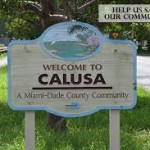 the golf course has created a rift in the community between the “ring road owners” and the have-not rings is an understatement.
the golf course has created a rift in the community between the “ring road owners” and the have-not rings is an understatement.
The terms of the settlement are confidential. So suddenly, friendly neighbors who have been chatting over the fence or while watering the lawn for the last two decades are suddenly silent and awkwardly avoiding each other.
Tobias’ letter, which Vazquez got in November a year after she bought the house, states that “progress has been made with respect to negotiating the terms for a possible ‘settlement’ to be entered into by the Trust, the owners of the property and the developer that has contracted to purchase the property… the contemplated settlement would obligate the Trust and Holders to support he developer’s efforts to remove the restriction and develop the property in exchange for receiving (i) legally enforceable restrictions and limitations with respect to developer’s development of the property and (ii) substantial payments to the Trust in a total amount that would vary depending on the developer’s success with getting restrictions removed and seeking development approvals, including the number of homes approved.”
It goes on to say that settlement would be distributed in accordance with the provisions of the Trust agreement and that more details would be coming soon. And sort of strong arms them into signing by threatening that they could lose anyway.
“When we circulate the Settlement Agreement, we will explain in detail why we recommend that the Settlement Agreement be approved in light of the risks associated with the ongoing dispute with the Landowners and the Developer. Of course, in the absence of a settlement, the Landowners and Developer might ultimately succeed in their efforts to extinguish the Restriction and secure governmental approvals to develop the Property without imposition of the Development Restrictions that we are attempting to impose and without any financial compensation or other benefits to the Trust members.”
Now, before people get their shorts in a bunch, this is not about sour grapes from the non-ring homeowners in Calusa Estates that did not get to vote (read: cash out) on lifting the covenant restriction on 9400 SW 130th Ave.
“That’s how the original covenant was set up,” said Sandy Lea-Oquendo a “non ring” homeowner who has lived in Calusa for 40 years and opposes the release. “Who in the community could have guessed that over 100 of them would accept that?”
This is not about a small group of wealthy neighbors clutching their pearls, clamoring to preserve their elite, little, private park. This is a diverse group of teachers, computer techs, business owners, realtors, paralegals and secretaries like Lea-Oquendo. Many of them are parents, grandparents or young couples hoping to become parents who seriously worry about how their neighborhood will look in just a few years.
They say that the development will flood area schools with new children, tax their firefighters 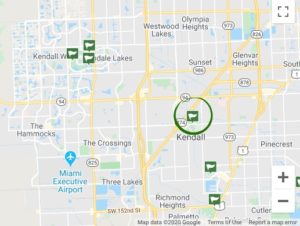 and police services and pour at least 1,000 to 1,500 more cars on nearby streets. People in The Crossings and Kenland are also concerned about the impact. But their voice didn’t count in the vote. Maybe it will count at the commission meeting.
and police services and pour at least 1,000 to 1,500 more cars on nearby streets. People in The Crossings and Kenland are also concerned about the impact. But their voice didn’t count in the vote. Maybe it will count at the commission meeting.
The developers, whose purchase of the land is dependent on them being able to build, also need a zoning and land use change from parks and recreation to single family home. The release from the covenant simply allows them to start applying for those.
And this is where commissioners can listen to the people who want to preserve the green space — all the people, not just the “ring” leaders — and possibly turn it into a flourishing and profitable environment, like an “underline” for the suburbs. Maybe even a golf course to take the place of Melreese in Miami or compete with TopFlight in Doral, Lea-Oquendo said.
“Those who know the history are disgusted that this company, who flaunts their philanthropy, their community investments, and their support of local initiatives, chose to wreak havoc in ours,” she added, referring to Bacardi Limited and their “corporate responsibility” spiel. Ladra guesses it’s not for their backyard.
“With their massive reach, PR, and renown,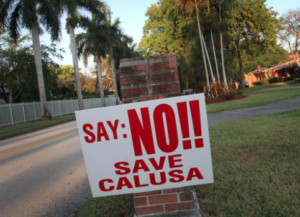 they could be heroes and give the sport of golfing across the country a boost,” Lea-Oquendo said, ever the optimist. “They could host national University or pro tournaments, institute programs to help hundreds of children, veterans suffering from PTSD, or anyone dealing with occasional anxiety.”
they could be heroes and give the sport of golfing across the country a boost,” Lea-Oquendo said, ever the optimist. “They could host national University or pro tournaments, institute programs to help hundreds of children, veterans suffering from PTSD, or anyone dealing with occasional anxiety.”
Alas, the Bacardis paid $2.7 million for the property in 2003. They stand to sell it for more than $100 million.
The only hope that the Calusa Estate residents and, indeed, homeowners from The Crossings and Kenland and the nearby communities in already gridlocked West Kendall have is that seven commissioners won’t sell them out.
We already know that commissioners Audrey Edmonson and Sally Heyman are likely to approve any development there. They had the audacity two years ago to call it “urban infill development.” In West Kendall. Which Ladra is sure they have never been to.
In fact, it ought to be a requirement of every commissioner to drive out to Calusa on Thursday afternoon before they take their vote. They might try to get there without taking Kendall Drive.
Either way, we might never see them again.

